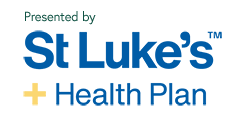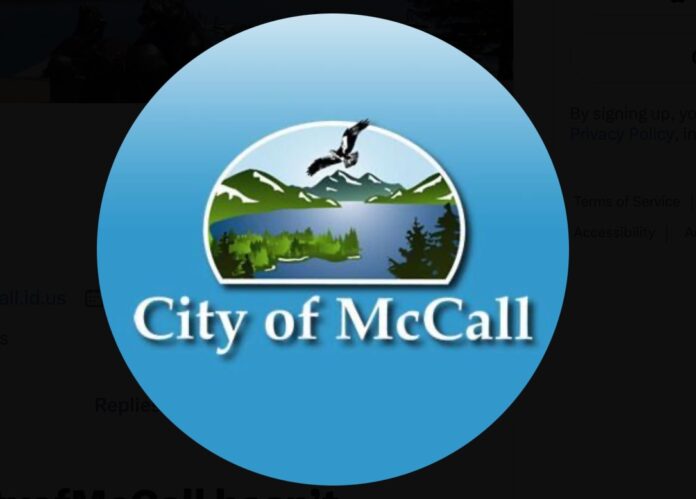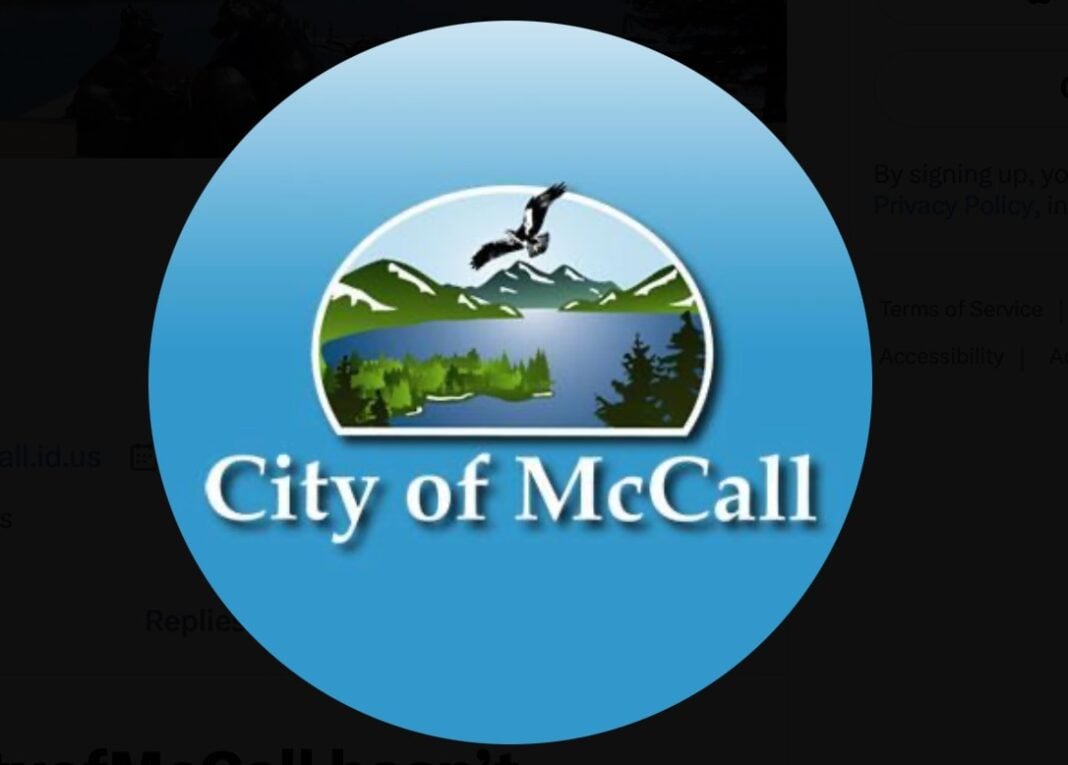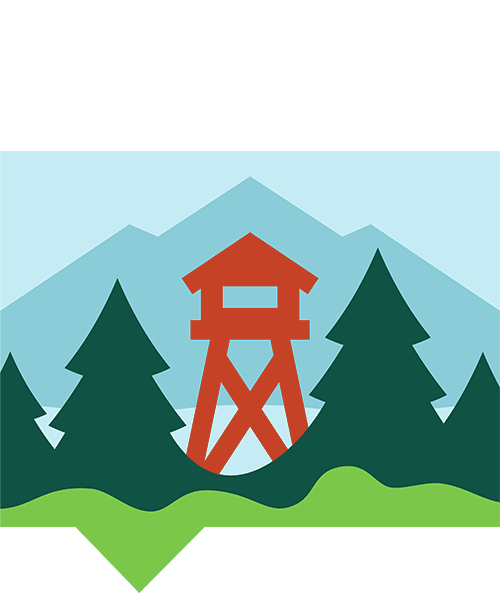Five candidates will compete for three seats on the McCall City Council in the Nov. 4 election.
Incumbent Mayor Bob Giles and council members Julie Thrower and Lyle Nelson will seek re-election by turning back challenges from local business owner Michael Weaver and Wayne Dolik, a retired real estate lender.
The three candidates who receive the most votes in the Nov. 4 election will be elected to four-year terms on the five-member city council, which is the decision-making arm of the City of McCall.
Early voting opens Monday, Oct. 20, at the Valley County Courthouse in Cascade. It will remain open Monday through Friday from 8 a.m. to 5 p.m. through Oct. 31. Absentee ballots can be requested here.
On Election Day, McCall residents can cast ballots at Idaho First Bank in McCall from 8 a.m. to 8 p.m.
Voter registration is open online through Oct. 24 and will also be available at the polls with current proof of residence and photo ID.
Valley Lookout sent a list of questions to each candidate regarding their candidacy. Their exact responses are published below.
The questions posed to each candidate were identical, except for minor tweaks based on whether the candidate is an incumbent or a challenger.
Challengers – Wayne Dolik and Michael Weaver
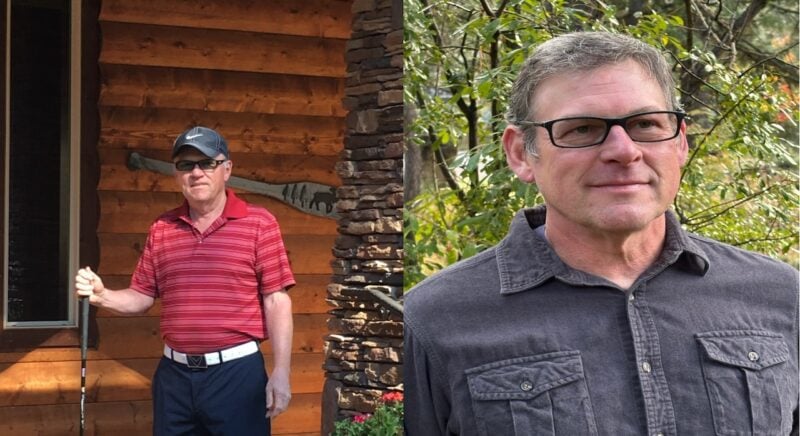
Why are you seeking election to the McCall City Council?
Dolik: Leadership needs to be responsive to the needs of local citizens.
Weaver: I’m seeking election to the McCall City Council because this town has woven itself into my soul over the past decade. The past four years have shown how division can dim our spirit, but every drive through McCall reignites my resolve to bring us together. I believe that the City Council should be representative of the constituents they serve, this Council grossly underrepresents the hourly workers and small business owners that drive our local economy. I’m moved by the laughter of kids at Payette Lake, the strength of our workers, and the heart of small businesses like Valley Auto, Glass Pro, McCall Sports and May Hardware. When elected, I’d like to be a liaison to the (NOW) County Impact Zone committee, uniting us to protect Payette Lake and uplift families and businesses with bold solutions. This experience drives me to lead with heart and transparency—join me at weaver2025.com to shape our future!
What would you like to change about the current city council’s governance?
Dolik: I would change how our city government functions. We have very little continuity of government. We bring in Business Managers who are not here for very long. At least that has been my observation. We need a full time Mayor who can serve a longer term. Or, we could vote them out, however, I doubt that we would, because Americans like keeping things the same. We as a city would need to vote on this matter. So, we need citizen‘s to put this on the ballot!
Weaver: I’d transform the current city council’s governance by fostering a more open, resident-driven process that reflects McCall’s diverse needs. The existing approach often feels detached, leaving our hardworking laborers, family-run shops, and lake stewards sidelined in favor of narrow agendas. I want the City Council to focus on the day-to-day struggle of the average worker and to know that climate action plans don’t feed people or pay the mortgage. I want to shift the focus toward innovative planning that honors our natural treasures like Payette Lake, supports economic vitality for local tradespeople, and ensures every neighborhood’s voice guides our path forward. The council should embrace creative strategies to address pressing issues, breaking from outdated habits to build a vibrant, inclusive McCall.
Are there specific decisions made over the last four years that you would’ve handled differently as a council member? If so, please briefly describe.
Dolik: Yes. When city management decided to operate the cities Municipal Golf Course, with all city employees, they should have followed the same plan they followed with Parks and Recreation a few years earlier. They should have brought in a professional management team to consult with the city and not run the golf course. I mean not a take -over, just advisors. They did not. I have read all the studies, and Cities lack proper oversight of public entities especially Golf Courses. I have seen the Sheriff and Police Chief here on the Golf Course but, not a single Council Member here in years. Do you know the McCall Municipal Golf Course is the center of the McCall Community? Our golf course is a community gathering place. Leadership, needs to be responsive to citizens as I said above.
Without donors like you, this story would not exist.
Make a donation of any size here
Weaver: Yes, I would have handled the McCall City Council’s 2025 AOI proposal differently. Submitting a map in May 2025 that mirrored the old 22,000-acre boundary, without stronger public advocacy or negotiation with Valley County, left us vulnerable when they cut it by 97%. As a council member, I’d have rallied residents early, pressing for a plan that protects Payette Lake’s watershed and supports local growth, ensuring our voice shaped the outcome.
Do you have any specific goals you would like the city to achieve over the next four years? If so, please be specific and briefly describe how you might achieve them.
Dolik: Progressive advocates frequently mention McCall needs to grow, well there is a caveat to that; do we grow so fast that we harm our rural environment and infrastructure? As a candidate I think not. McCall needs a responsible Master plan which takes into consideration schools, water supply, sewers and roads before large developments are approved, not the other way around. Otherwise, the tax payer is on the hook for improvements. The developer must pay for need improvements to infrastructure before approval. We do need a Master Plan, and if we do not get one, do we get a big county urban mess called a city? I am told that “they” are working on one. Is it a little too late?
Weaver: I have three achievable goals for McCall over the next four years. First, I’d work to improve access to affordable housing by advocating for zoning reviews to encourage smaller, workforce-friendly units and exploring a small business investment group to fund housing projects. Second, I’d enhance Payette Lake’s health by tackling milfoil through expanded clean-ups and partnering with county and state agencies for herbicide-free solutions like manual removal. Third, I’d promote small business growth by pushing for simplified permitting processes, collaborating with city staff. I’ll achieve these through resident feedback sessions, leveraging city resources, and building local partnerships.
National inflation has hit many McCall residents hard in recent years, but has also been felt across city departments due to rising costs for operational supplies. How do you think the city should balance its need to cover expenses with residents’ need for financial relief?
Dolik: The city should not cover these expenses. Housing has become corporate welfare too, and others have supplied housing as a business expense, because they paid for it, Tamarack, Brundage, and Shore lodge as well as others too, perhaps Whitetail too. Let people travel here for jobs; let them drive here. Otherwise please let free enterprise make this a corporate expense!
Weaver: Inflation has indeed taken a toll on McCall residents, with Idaho’s cost of living rising 4.9% in 2024 and the City of McCall’s cost of living exceeding the state COL by 17%, far outpacing wage growth and exacerbating housing affordability—home prices jumped 7%, in McCall the median home prices exceed $700,000.00. City departments face similar pressures, with operational supplies like fuel and materials up 15-20% since 2021, straining budgets and forcing tough choices. As your council member, I’d push for a thorough budget audit to cut waste. We should review where our Local Option Tax dollars are being spent as we were told they are supposed to help alleviate the impact of tourism in our community not special interests or pet projects. We’d explore partnerships with state programs to offset housing inflation, ensuring workers can afford to stay. Let’s navigate this together.
To balance city expenses with resident relief, I’d prioritize uncovering efficiencies through a detailed audit of operational processes—streamlining procurement to reduce supply chain waste and optimizing staff schedules to cut overtime costs. I’d push for process improvements, like digitizing permit applications to save time and resources. The recent loss of our impact zone frees up talented staff to focus on pressing local needs, such as enhancing Payette Lake projects and supporting small businesses. I’d prioritize state grants for infrastructure upgrades and host town halls to refine these efforts, ensuring relief for workers.
What should voters know about you before casting their vote?
Dolik: I am a 75-year-old man running for City Council. You ask why? Because I believe that leadership should be responsive to the citizen. We need leaders who are close to the people. Unfortunately, people do not always get what they want or need. To get people who are engaged to represent the American people will be a challenging feat. So, why not let a few of us try!
Weaver: Before voting, know I’m your neighbor and fellow worker and a McCall resident shaped by an education in logistics and a record of building successful small businesses, giving me a practical edge in solving community challenges. My hands-on role in creating a thriving logistics department honed my ability to streamline operations, while growing businesses taught me the resilience our local entrepreneurs need. Working at May Hardware has deepened my understanding of the daily struggles and strengths of our workers, fueling my commitment to this town. I’m dedicated to preserving Payette Lake’s beauty and uplifting every neighbor
Please provide your age, occupation, number of years living in McCall. What experiences do you have that you believe make you a qualified city council candidate?
Dolik: As a teenager, I worked for Sears & Roebuck, selling Paint, and people bought a lot of paint from me. One day, the Sears & Roebuck Store Manager told me that I was a cracker-jack salesman and that I could have any commission job in the store. I asked if I could sell shoes. That was my first commissioned job. Later, I moved to a high-fashion store, Bullocks Company. I did well and it paid for my college at Fullerton Jr. College and later at U.C.I. Irvine. I became a big-ticket salesman and sales closer. From 1980 to 1992, I incorporated as Wayne Company & Associates Inc. in big-ticket sales and later became a licensed real estate corporation in lending money to homeowners. I also was the President of A.H.E.P.A., 1990 Disneyland Chapter Anaheim, Ca., American Hellenic Educational Progressive Association. I have lived in McCall for 15 years. I served as Vice-President and Director of the McCall Men’s Club at our Municipal Golf Course here, where we, the Directors, raised approximately $140,000 to donate to various city and golf community projects. These included a single donation of $45,000 to our local High School Golf team for a golf simulator, 2013-2023. I also served with my very dear friend, J.J. Johnson, as a Director for Snow Shoe Golf. 8-10 years. J.J. was pro- business in McCall and so am I. I have served the Valley County Republican Central Committee as the McCall Precinct Committeeman, currently serving. 8 years +. I have been elected twice during the Presidential Primaries. I served as Caucus Captain at our public high school for the Presidential Primary “R”. In the last primary ballot, I was re-elected by 377 votes. I hope this information is helpful. I am Retired, and I believe that I have the time to be of service to my community.
Weaver: Michael Weaver, 56, Owner McCall Home Watch Service. Formally Operations Facilitator for May Hardware, now still a member of the team but in a part time capacity. Lived in McCall for 10 years with my wife of 28 years, Jodi, and our awesome MCPAWS chocolate lab Hedy.
My qualifications for McCall City Council are rooted in a decade of living here with a deep love for this community. My journey began when my parents moved us from California to Eagle, Idaho, when I was four—my father was a Welder for MK, my mother serving as a social worker while earning degrees at Boise State. Raised with Idaho’s spirit, I learned from my mom bringing home those in need that opportunity isn’t guaranteed for all. I was fortunate to have childhood weekends in McCall creating lifelong memories.
My professional path blends logistics expertise with small business success. I’ve honed skills in managing complex operations, a foundation that strengthens my approach to community challenges. I’ve also built and grown small businesses, understanding the grit it takes to support local entrepreneurs. Recognized as a leader for transforming an industry and serving on advisory boards like Thelon Capital Management, I bring a fresh perspective shaped by a decade of calling McCall my home, gaining an understanding of local politics. Hands-on roles like volunteering for Toys for Tots, designing their website and organizing events to connecting with my team at May Hardware, deepen my understanding of being engaged.
Anything else not covered in the questions above?
Dolik: N/A.
Weaver: One key vision I haven’t shared is establishing a ‘McCall Resilience Workshop’ to showcase our entrepreneurs and to empower residents with skills and resources, inspired by the self-reliance I learned growing up in Eagle, Idaho, watching my parents navigate life’s challenges. I would help facilitate hands-on workshops, like the folks at Valley Auto have offered in the past for basic automobile maintenance or lake-friendly landscaping from local workers. Perhaps providing seed funding or tools for small business startups, helping families and entrepreneurs thrive amid economic pressures. I’d launch it by collaborating with the McCall Community Library and seeking community donations and grants. It’s a foundation for a stronger, united McCall.
(Editor’s Note: A plug line for Weaver’s campaign website was removed from several of his Q&A responses after it first appeared.)
Incumbents: Bob Giles, Lyle Nelson, and Julie Thrower
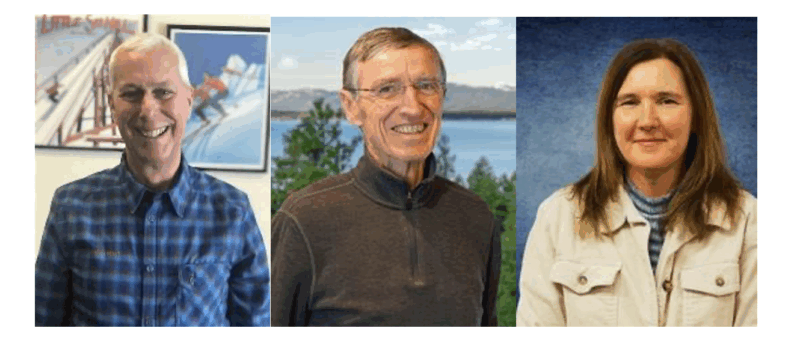
Why are you seeking re-election to the McCall City Council?
Giles: Quality experience makes a difference. Consistency in local government also matters. I have served on City Council for over 11 years and have learned that while the site specific issues may change year by year, the overall desire of our community remains the same. Our constituents consistently desire a local government that listens to their opinions and considers their ideas when making decisions.
Nelson: I have served on the McCall City Council for over 4 years, and I believe my experience and leadership make me well-positioned to continue to serve the community for another 4 years. In addition, there are plans and programs that I would like to see through to their completion. As an example, in the next 2 years the citizens of McCall will adopt a new McCall Comprehensive Plan. This plan declares our collective priorities around housing challenges, land use, managing growth, protecting our natural and built environment, transportation, and many more citizen concerns. It shapes what we want our future quality of life to be. I believe my listening skills, history with McCall, and extensive regional relationships will help us define and shape a positive future.
Thrower: I deeply care about the future of our community. Being on City Council has given me a deep understanding of our city’s needs and our collaborative approach to solving complex problems. I would like to continue advocating for our community’s needs to enhance our quality of life.
What are you proud of from your last four years on the council?
Giles: Helping voters understand the importance of planning for important infrastructure needs. A recent example would be the passage of our water bond that ensures a reliable supply of domestic water at reasonable monthly rates. Approving the City’s Housing Action Plan that has lead to more Workforce Housing opportunities. Completion of the City Downtown Core streets and sidewalks. Construction of the New Library and remodeling the old building into a Community Hall. Watching young families with children enjoy the Brown Park Improvements. Building credibility with voters on the advantages of our Local Option Taxes which resulted in a renewal of the one percent sales tax dedicated to streets. Consistently approving annual budgets that balance revenues with expenditures. Ensuring our budgets contribute to a rainy day fund large enough to withstand unforeseen downturns in the economy.
Nelson: I take great pride in the small, consistent things our current council and city staff do daily that accumulate into achieving our priorities and major outcomes. Examples include all the youth programs at the library and youth outdoor events hosted by the Parks and Recreation Department, each extra extension of our city-wide pathways, the City’s financial and indirect support of local non-profits that enrich lives for everyone, and supporting economic development through collaboration with the Chamber of Commerce and West Central Mountains Economic Council. It’s our job as council members to articulate a lofty vision, but we get there by the daily accumulation of linear activities. As a specific example, I am proud we held to the vision of building a phenomenal library despite the rapid escalation of building costs during the COVID disruption.
Thrower: For a small town, McCall is a leader in the State in many ways, particularly in environmental protection, short-term rental regulations, and with affordable housing initiatives. And we recently started discussing a destination management plan to manage impacts of tourism. All this is not without challenges created by State legislation and decisions by our County government. I’m proud that the Council and our community continue to support forward-looking policies to make our town better.
What are a few failures or challenges the council has faced during the last four years, and how have those better equipped you to serve the city moving forward?
Giles: The Council has faced many challenges that affect our revenue. The City has been very successful in competing for National and State Grants, but we are hearing future grants may be smaller and more difficult to secure. I have learned that we must be aware of such shifts and maintain budget reserves that enable us to deliver essential public services.
Nelson: Two challenges that require renewed emphasis are sustaining our local culture (friendly, mutually supporting, compassionate, outdoorsy) and balancing economic growth with environmental stewardship. Our adoption of new design and land-use guidelines will provide the City, developers, businesses, and homeowners with a clear understanding of that balance. Our loss of administrative management over the previous McCall Area of Impact is an ominous setback to the environment and quality of life in McCall. However, we remain committed to engaging with partners to protect our City, Payette Lake, and the surrounding areas.
Thrower: Population growth projections for McCall show that for the next 10 years, population growth is predicted to be primarily from seasonal homes. The greatest challenge facing McCall is managing impacts from that continued tourism/vacation home-related growth—increased housing prices, increased recreational pressure on our natural resources (particularly Payette Lake) and infrastructure, increased traffic, and general impacts to our community cohesiveness–while recognizing that our economy is largely based on tourism.
Do you have any specific goals you would like the city to achieve over the next four years? If so, please be specific and briefly describe how you might achieve them.
Giles:
1. Diversify our economy that is currently relying so heavily on visitors, tourism and the hospitality sectors.
2. Add 200 workforce housing units that are deed restricted (rental units or first time home buyers).
3. Build powerful public-private partnerships to help implement actions and achieve goals described in our Comprehensive Plan.
All three goals will require our City Staff, City Manager, and Council to work with our many partners including the Chamber of Commerce, Saint Lukes Hospital, Albertsons, the McCall-Donnely School District, the McCall Fire District, Idaho Department of Lands, and the Forest Service. The City must also explore opportunities for expanding the workforce associated with post covid year round residents.
Nelson: I think the greatest challenge facing the City and the people who live here over the next four years will be cost of living. It’s more than just affordable housing. We need affordable day care; greater resources for non-profits providing food, transportation, heat, and after-school programs; and economic vitality. The City is a key partner in supporting affordability and promoting the economy. A second priority is building community engagement and public discourse for updating our McCall Comprehensive Plan, which is a collective vision for the quality of life in McCall and how to achieve it. A third goal is to create an all-inclusive stakeholder-based structure that results in a strategic plan and buy-in to protect Payette Lake from further environmental degradation.
Thrower:
- Prioritize protecting Payette Lake’s water quality. Support and work with the Payette Lake Watershed Advisory Group and other stakeholders to develop a data-driven lake management plan prioritizing protection of water quality, management of milfoil and invasive species prevention, and enhancement of fisheries and recreational opportunities—and support its implementation though the use of city resources (staff, funding).
- Promote multi-modal transportation: Champion initiatives that enhance year-round walkability/bikeability of our town by supporting pathway connections, and support measures to enhance street safety, and give better opportunities for residents to commute within and tourists to explore McCall without a car.
National inflation has hit many McCall residents hard in recent years, but has also been felt across city departments due to rising costs for operational supplies. How do you think the city should balance its need to cover expenses with residents’ need for financial relief?
Giles: I believe the quality services provided by every City Department rely on a workforce that has very little turnover. Employee retention means budgeting for adequate training and a compensation package that attempts to keep up with inflation. City Council and Staff annually review all opportunities to increase revenues from user fees, while at the same time recommending and approving an annual budget that increases less than or equal to three percent. The City is fortunate to have Local Option Taxes approved by voters. These taxes spread the burden across visitors and residents.
Nelson: I believe the City is performing well on this issue now. The City’s balanced budget enables all departments to deliver their essential public needs. It contains financial support for local non-profits that provide cost-relieving services, and it reserves some funds for unanticipated costs. We look for other sources of funds to offset property taxes; for example, we have been extremely successful in bringing grant revenues to the City. In addition, protecting our authority to collect a Local Option Tax, which some state legislators would like to eliminate, is vital to our infrastructure development.
Thrower: The Council and city staff routinely consider the financial impact of city operations on our residents. For example, improvements to the water plant are being paid with a bond that spreads the cost of improvements overtime and will capture those costs from new construction. We’re increased our LOT for street improvements this year, which shifts some of the tax burden on visitors, and we added a provision in the ordinance to allow some of that money to be used in a public-private partnership for developments that commit to local workforce or affordable housing. We’ve also found and adopted cost-saving technologies with new billing software that will save residents money on processing fees when bills are paid. We have for years supported the transit system through our budget process that provides free transportation from Cascade to Brundage. Importantly, despite the rising operational costs, the city is committed to maintaining the level of service expected from our residents, and to finding ways to maintain, or where needed, improve our infrastructure.
What should voters know about you before casting their vote?
Giles: The City of McCall has developed plans such as the Comprehensive Plan, the Housing Action Plan, and several department action plans that provide a smart path forward. I believe our job as Council Members is to help implement those plans to ensure growth is managed in a predictable manner that helps achieve the vision and goals our community desires.
Nelson: As many people in McCall know, I am hugely devoted to maintaining the character and quality of life for all locals. I serve on numerous boards that impact healthcare, youth mental health, drug diversion, and our culture.
Thrower: I try to represent McCall with character, integrity, and with the intention to effectuate the community’s interest. I’m committed to working collaboratively with other Council members so that we can continue to be productively working for McCall, and not for our own interests.
Please provide your age, occupation, number of years living in McCall, and experiences that you believe make you a qualified city council candidate.
Giles: Age: 72., Occupation: Member of McCall City Council, and Mayor. Alpine Ski Coach for the McCall Winter Sports Club. Moved to McCall in 1998. Experiences: Eleven years serving on McCall City Council, Mayor the past five years, thirty-five year career with the Boise and Payette National Forests.
Nelson: I am 76, grew up in McCall, attended West Point Military Academy, and spent the last 20 years of my career as a community health professional. In that profession, my primary focus was on building healthy, livable cities in all of Idaho. All of my life experiences – service in the Army, competing in and helping to organize the Olympics, working in healthcare administration – have been building grounds for learning and implementing problem- solving skills.
Thrower: Age = 52; Occupation = Attorney; Years living in McCall = 9+.
In the last four years that I’ve served as a council member, the city’s work has become more substantial, and the issues have become more complicated. I have a background in science and law, both which involve the ability to analyze issues, consider opposing views, and think strategically to address complex challenges and make informed decisions. I believe these skills will serve the city and the public well.


